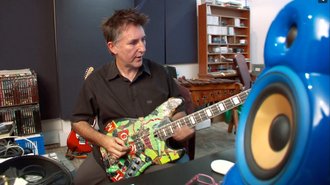Radio Art Residency: Fourth scholarship holder is Warrick Swinney
From 15 September to 15 December 2022, the Radio Art Residency will be held by composer, producer, musician and sound designer Warrick Swinney. With his project "The ghostly disappearance of my country's future: a sonic hauntology", the South African-born composer focuses on re-approaching his existence as a recorded being through personal archives.
In his sound art, Swinney explores the topics of silence, self-censorship and tensions between politics and art in totalitarian states. Thus, he artistically explored political and social similarities in the upheavals in post-Soviet countries and his home country South Africa after apartheid. Swinney was influenced by the post-punk ethic in the »Shifty Studios« of the 1980s, during the turbulent period between the collapse of apartheid and South Africa's transition to democracy. This influence is also reflected in his »do-it-yourself« aesthetic, which stems from a deep interest in sound, music and politics.
Swinney worked at Milestone Studios (2000 - 2018) in Cape Town in sound design and music production as well as performance and sound-based art. In 2015 he exhibited two video works at the Venice Biennale (»All the world's Futures«). In 2018, he graduated with distinction from the University of Cape Town with an MFA. He is currently a doctoral candidate at the University of the Western Cape and teaches courses at the Michaelis School of Fine Art. His teaching focuses on practical and theoretical sound studies that address contemporary ethical and political issues.
About the Radio Art Residency
The Radio Art Residency is an international fellowship programme for artistic practice in radio. The residency is a joint project of the Goethe-Institut and the Professorship »Experimental Radio« at the Bauhaus-Universität Weimar in cooperation with the Hochschule für Musik FRANZ LISZT, Deutschlandfunk Kultur, Radio Lotte, the EIGENHEIM Weimar/Berlin and the ACC Galerie Weimar. The aim of the scholarship is to support independent and open-ended artistic work and to help realise new artistic works. From the use of radio as an exhibition space for artistic works to the use of radio as a medium of real time, the residency offers diverse possibilities for shaping artistic practice.
For more information on the Radio Art Residency, please visit the project's website at.
https://www.uni-weimar.de/projekte/radioartresidencyweimar/
If you have any questions, please do not hesitate to contact Eleftherios Krysalis, project coordinator of the artist residency, by e-mail at eleftherios.krysalis[at]uni-weimar.de.

